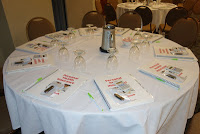We’ve Moved!
Please update your records; our new address is
LA Kelley Communications, Inc.
37-39 West Main St. #8
Georgetown, MA 01833
Email and phones are the same.
Thanks!
Please update your records; our new address is
Email and phones are the same.
Thanks!

Pennsylvania has had a lot of activity regarding the Affordable Care Act, and the audience was itching to ask questions. Ruthlyn presented a one hour talk on the ACA; I followed with a short presentation on the importance of choosing a healthcare plan; Michelle then presented her highly regarded workshop, in which participants actually compare plans and crunch numbers and in the end, tell us which plan is best for their budget!
The audience peppered the speakers will excellent questions; this could be one of our liveliest audiences yet! I think there was a lot of deep concern about the ability of the government to take over aspects of our health care. Some of the highlights of the Q&A:
• The Federal government will run the Marketplace for individuals, not the state of PA
(The Marketplace, formerly known as exchanges, is a web-based program that allows people to
compare many different healthcare plans based on benefits and costs to assess the best one for each person)

• If you make $25,000 a year, subsidies will be almost 100%
• You don’t have to be uninsured to take advantage of the Marketplace
• If you work for a large employer, you can’t drop your plan and go to the Marketplace; if you do, you won’t get any subsidies
• Insurance companies know who you are! Don’t ignore your insurance issues just because you don’t want them to know you have a bleeding disorder. Believe us, they know! They know your product, whether you have an inhibitor, your severity level.
• Without the Marketplace, you could waste hours trying to compare plans (Aetna has over 200 plans, for example!
• Coverage is not the same year to year, even with the same insurance carrier. Read you policy book annually!
 • We often look at cost only of a plan, but also look at what you get for the cost, the benefits
• We often look at cost only of a plan, but also look at what you get for the cost, the benefits
• Sometimes factor covered under Pharmacy benefits looks more affordable, but more and more we are seeing specialty tiers… instead of a flat rate copay (like $50), you could instead pay a percentage of your drug, like 10%. 10% of factor is unaffordable!
• NHF is supporting a bill in Congress to do away with specialty tiers.
Go NHF! Thanks to everyone who attended our event!! And thanks to Baxter for sponsoring the entire event, and to the Western Penn Chapter for hosting this.


So if you received and read your issue of PEN by now, you’ll note that we have a great feature article on apps that help you track your bleeds and sometimes even track your factor usage. Important given what’s coming don in the insurance field these days.
But that’s not the point of this blog. The author is a brilliant and creative young man with hemophilia named Aaron Craig, a hemophilia wunderkind, who makes movies (really), develops apps and roams the earth looking for things to invent.
When I noticed a few people wearing these shirts at hemophilia events, I wasn’t too surprised to note that his company, MicroHealth, had created them to raise awareness of hemophilia and the need to take your factor. The shirts say “keep calm and factor up” on them. Aaron writes, “The community has loved them. So what we did was we put them up for sale online and 100% of the profits go towards a chapter of the purchaser’s choosing. Each chapter has or non-profit has their own promo code to enter during checkout.” Nice!
Aaron even created a code for our own Project SHARE, our factor donation program. It’s simply “share”. The link to purchase the shirts is: http://microhealthnyc.myshopify.com/products/keep-calm-and-factor-up-t-shirt
The profits per each shirt sold with a code comes to about $10 per shirt. When the promotional is done on August 1st, Aaron will tally up how many shirts were sold with the SHARE code and will send a check for the amount of profits accumulated.
This is so important. Last year we shipped about $6 million worth of factor. Our shipping costs to developing countries is well over $20,000. We never expect the recipients to have to pay shipping. So Aaron’s idea is timely and helpful. Go ahead, buy one and get shirty with me!
Would you like to be added to our email list to continue to recieve future editions of PEN in PDF format?
Yes: No:
Please share your location to continue.
Check our help guide for more info.

